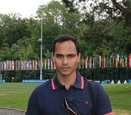 Large-scale methane measurements on individual ruminants for genetic evaluations
Large-scale methane measurements on individual ruminants for genetic evaluations
Md Najmul Haque

Tell us about yourself (Who are you? Where are you from? What is your educational background?)
I am Md Najmul Haque originally from Bangladesh. I am educated in the field of Animal Husbandry and Animal Nutrition. Since my graduation I have been working with large ruminant nutrition and greenhouse gas mitigation. Afterward I was fortunate to join as PhD fellow at the Department of Large Animal Sciences, University of Copenhagen, Denmark. Recently I have completed my PhD on ruminant methane mitigation through dietary manipulation.
What is your area of expertise?
Ruminant Nutrition and methane mitigation.
Where does your focus lie within your current project(s)? (related to methane)
Nutritional strategies for methane mitigation and application of CO2 method .
What would be the added value for you of joining an international researchers network? (such as the METHAGENE network)
It is a great platform to exchange knowledge and ideas and learning about new developments on animal methane mitigation.
What and/or who inspired you to make a career in science?
Concern about global warming and climate change was my motivation to work for a sustainable environment. Being an animal nutritionist, working on methane mitigation from ruminants was my finest choice which contributes to the efficient animal production as well as environmental protection.
What do you enjoy most about your work?
I enjoy working with people; I have got a real passion for the ruminant's methane mitigation, rumen biochemistry and microbiology in particular. I have learned a lot and still there lot to learn in terms of the most sustainable ways to optimize animal production and reduction of environmental impacts.
What is your most stand-out or surprising moment in science so far?
It is exciting that globally, researchers are responding positively to the issues on livestock methane production, though it’s a small sub-unit of agricultural industry. There are already a lot of technologies developed in the sector that help to manage the herd easily and favour research, engaging large numbers of animals to predict the global scenarios.


